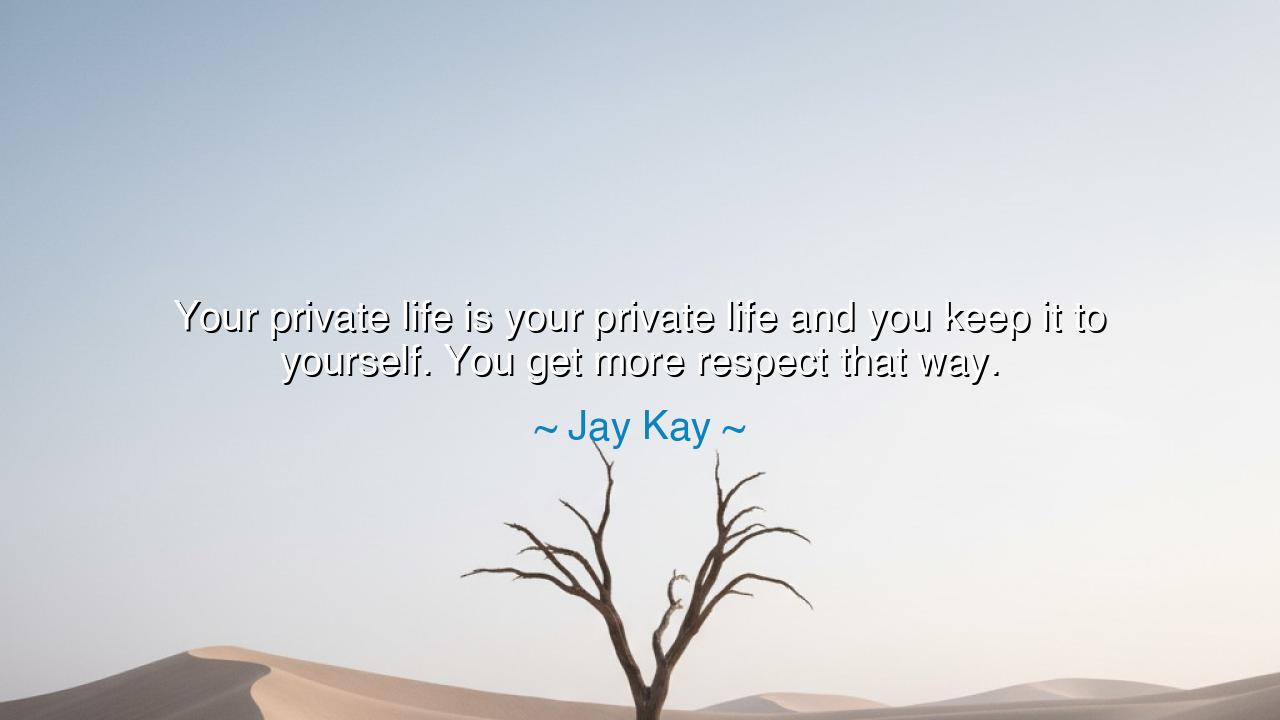
Your private life is your private life and you keep it to
Your private life is your private life and you keep it to yourself. You get more respect that way.






The words of Jay Kay—“Your private life is your private life and you keep it to yourself. You get more respect that way.”—speak with the wisdom of one who has seen how the world devours the personal. In these words lies a teaching about dignity, boundaries, and the sacredness of the inner self. For in an age where many parade their secrets for applause and spill their intimacies for fleeting admiration, Jay Kay reminds us of the ancient truth: what is most precious should be guarded, and what is most intimate should not be squandered for the gaze of strangers.
The ancients revered the power of silence. The Pythagoreans, disciples of the philosopher who measured the harmony of the spheres, were trained to keep silence for years, learning the weight of words and the strength of restraint. To them, not every truth was to be spoken, for what is held within shapes character. The private life—the realm of family, love, friendship, sorrow—was not meant for the marketplace but for the hearth. Jay Kay echoes this ancient discipline: by keeping what is most sacred concealed, one commands respect both from others and from oneself.
History shows us examples of this principle. George Washington, though a public man and leader of armies, carefully guarded his private life. He rarely spoke of his personal joys or griefs in public, and thus he stood before the people as a man of steadiness and gravity. Because he did not squander his privacy, his words carried weight, and his silence inspired reverence. By contrast, those who scatter their personal lives before the world often lose both dignity and credibility. For familiarity, when too freely given, breeds contempt, but measured reserve breeds respect.
There is also a deeper meaning: to keep one’s private life private is to maintain sovereignty over the self. When a man reveals everything—his secrets, his passions, his wounds—he gives others power over him. They may mock, exploit, or dismiss him. But when he holds back, when he draws a veil over his private world, he preserves strength, mystery, and independence. This is why kings kept inner chambers, why prophets retreated to deserts, why wise men knew the value of what was unseen. The guarded soul is not weak; it is strong.
Yet let it not be thought that to keep a private life is to be cold or distant. It is rather to discern between the sacred and the common. Share openly with those who love you and stand by you; but do not cast your pearls before the crowd, nor seek the approval of the multitude by bartering your intimacy. Jay Kay reminds us that in this balance lies true honor. People may admire talent or beauty, but they grant respect to those who know how to guard their inner life with dignity.
The lesson for us is this: live openly in deeds, but discreetly in matters of the heart. Let your work, your character, and your integrity shine in the public square. But let your sorrows, your joys, your family, and your loves be guarded as treasures. This way, you will walk with freedom, and others will honor you not only for what you show, but for what they cannot claim to possess.
Therefore, let us embrace this teaching. Do not chase attention by unveiling your whole soul. Do not sell your intimacy for fleeting praise. Instead, honor the sacred space of your private life, and in doing so, you will preserve both dignity and peace. For respect does not come to those who shout their secrets, but to those who carry themselves with quiet strength, revealing enough to inspire, but keeping enough to remain whole. Thus the ancients would nod in agreement with Jay Kay: the private guarded life is the life most respected.






AAdministratorAdministrator
Welcome, honored guests. Please leave a comment, we will respond soon